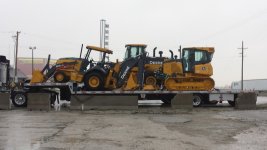Sodo
Elite Member
- Joined
- Apr 21, 2012
- Messages
- 3,302
- Location
- Cascade Mtns of WA state
- Tractor
- Kubota B-series & Mini Excavator
As for the owners manual, nothing about trailering, only allow turbo to cool down before stopping engine 3 to 5 minutes at idle.
And this cooldown,,,,, is only necessary if you've been making it put out horsepower with a capital H, like plowing, cultivating etc. Pretty much full RPM usage. Turbo gets hot when you pour the coal to it.
If you shut down abruptly when HOT the radiator can boil over too, so anyway it's nothing new. An example might be that while you are plowing at full throttle and the phone rings, and you have to shut OFF the engine so you can hear the phone. You should idle it for 3-5 minutes instead, and call the guy back.
You don't have to sit there and wait,,,, for example if you were just traveling back to the barn (or any other low RPM, low power, (=low exhaust manifold pressure) usage).

